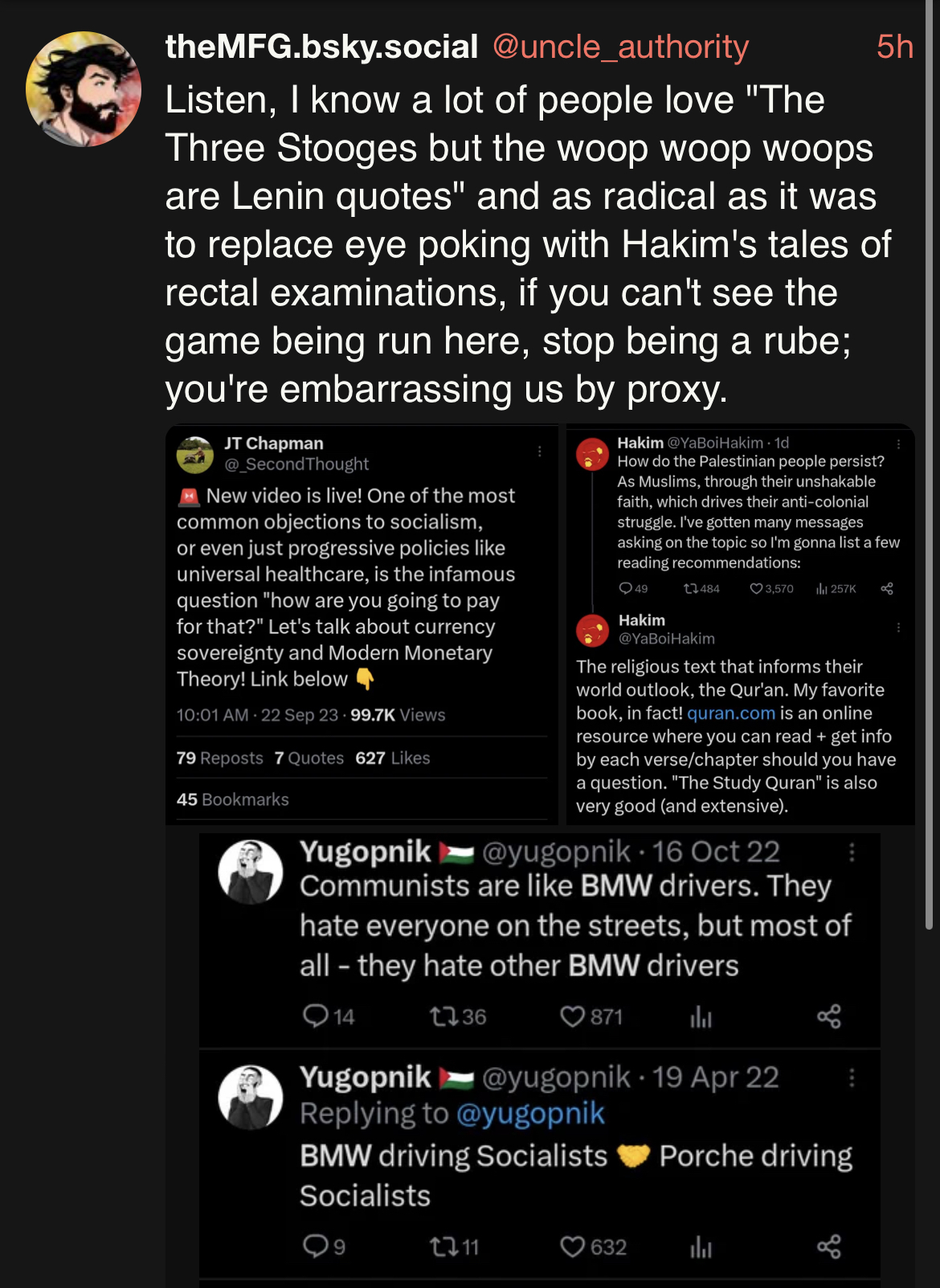view the rest of the comments
the_dunk_tank
It's the dunk tank.
This is where you come to post big-brained hot takes by chuds, libs, or even fellow leftists, and tear them to itty-bitty pieces with precision dunkstrikes.
Rule 1: All posts must include links to the subject matter, and no identifying information should be redacted.
Rule 2: If your source is a reactionary website, please use archive.is instead of linking directly.
Rule 3: No sectarianism.
Rule 4: TERF/SWERFs Not Welcome
Rule 5: No ableism of any kind (that includes stuff like libt*rd)
Rule 6: Do not post fellow hexbears.
Rule 7: Do not individually target other instances' admins or moderators.
Rule 8: The subject of a post cannot be low hanging fruit, that is comments/posts made by a private person that have low amount of upvotes/likes/views. Comments/Posts made on other instances that are accessible from hexbear are an exception to this. Posts that do not meet this requirement can be posted to !shitreactionariessay@lemmygrad.ml
Rule 9: if you post ironic rage bait im going to make a personal visit to your house to make sure you never make this mistake again


The material conditions that made religion bury deeply into the cultures of the world will slowly fade as the world progresses.
As marx pointed out religion is the opium of the masses, not as in a party drug but as in a drug that eases the pain and suffering off the oppressed.
Sure, and he's right as far as religions -- and especially state-run bourgeois religions -- hampering and preventing revolution. But we have material evidence that (1) religion can and does give voice to and even assist revolutions (Marx and Engels both used religious imagery in their writings) and (2) post-revolution, the desire for spirituality and forms of religion persist even with upheaval and reorganization of material conditions from feudal to capitalist to socialist. Maybe it will die off completely in the future, but that hasn't happened in any AES country to date and that's really important to note.
This are my thoughts.
(1) religion can be used as a tool for our cause temporarily pre-revolution and early socialist development, but ultimately it has to be left behind because it is not compatible with the dialectical materialism outlook. Also for religion to work in our cause we need to adapt it, a great example is the liberation theology synthesis developed by latin american priests.
(2) is simply not the reality, in developed nations the trend is that newer generations are less religious than the last one. The transition to an atheist society is, just like everything in nature, dialectical. Religions will slowly wither away to give place to materialism.
We are mostly in agreement here. Yes, I 100% agree that liberation theology and other grassroots religious movements that incorporate dialectical materialism has to be incorporated at some level, superseding the bourgeoise strains of religions in totality. My username's namesake is named after the guy who is credited with black liberation theology after all. No disagreement here.
But my argument is that we can't look at capitalist countries to tell us what will happen in communist countries. Its the wrong dataset. We need to look at folks in AES countries to determine how materialism and religion have interacted post-revolution. China's Christian population has grown significantly in the last two decades. North Korea has had presbyterian members of the upper cabinet, even having a Christian political working group at one point. Vietnam's folk religion continues to grow, and over half of Cubans are religious. The theory that religion will eventually disappear post-revolution simply hasn't happened and, in fact, many people have embraced religion post-revolution.
This seems fascinating, do you know a source where I can learn more about this? Everything I've found about NK's relationship with religion is filled with "you get executed if you have a Bible"-style propaganda.
Sure. Kim Il Sung grew up Presbyterian, his maternal grandfather was a Presbyterian minister, his mom was a deacon and lifelong Presbyterian, and his family especially his mom worshiped at a presbyterian church in DPRK. Several members of the dprk cabinet (or whatever it's called) were Methodist or presbyterian ministers. As long as they were anti-imperial and supported the dprk, there was no issue. There was a Presbyterian seminary in Pyongyang until 1938 that resumed training in the 1970s though I don't think it's specifically Presbyterian any more, but it's still open and training ministers within DPRK. Kang Ryang-uk was an incredibly important figure in the early DPRK. He was the vice chair and chair of the KSDP, the 2nd & 7th Vice President, and secretary and vice president of the People's Assembly. He was a Presbyterian minister and maternal uncle of Kim Il Sung and studied theology at the Pyongyang Seminary. Kang also helped found the Korean Christian Federation which continues to this day.
You can read more here (best bits at the end): https://sci-hub.se/https://doi.org/10.1093/jcs/48.3.659
Thanks!
Lets remember that the conditions of these AES countries are still relatively bad, it is understandable that religion is still popular. It is still a fundamental contradiction that has to be resolved.
China's conditions are not bad, and their dialectic has already taken reality into consideration as it seeks to solve this contradiction. Read "The Basic Viewpoint and Policy on the Religious Question during Our Country's Socialist Period" released in 1982.
There was significant decrease in religiousness in all socialist countries and its a steady trend as long as state remain focused on proper materialist education.
Really, looking at all the current and former AES, i would say that getting rid of religion is easier than getting rid of petty bourgeois sentiment (something that Lenin said it would be the hardest thing to do, and which was also not successful but with some progress in AES).
Sorry, I don't really have the capacity to write the long response that this deserves but I can add few things that complicate that overall picture.
Agreed on the petty bourgeois sentiment. Religion overlaps with that in huge amounts, of course, so if religion is to be allowed in AES countries, it needs regulation and proper education that both re-educates indigenous populations especially those that were converted from, say, American evangelicals and makes sure cults like Shen Yun don't pop up -- this obviously happens outside of religion too but it's particularly insidious within it.
You're basically right, but note even in the formerly AES countries, despite plunging into deep crisis, the number of atheists remain at much higher levels than it was before socialism - even in country like Poland. It's most visible in Czechia iirc. So it does work. Few more generations (it was like not even 2 basically) and much more would disappear, though probably not entirely (see Japanese christianity emerging after Meiji restoration, though it emerged 95% reduced and heavily influenced with buddhism).
I think there isn't much problem with disorganised and decentralised religions, at least as the party remains strictly atheist, but something like the catholic church is immense danger, the worse that every move against them, even for completely nonrelated reasons (again look at Poland where some priests were arrested for spying and other antisocialist activities) will be always portrayed as attack on religion, so the socialist country would necessarily have aim to remove their political power, most likely by expropriation of their property - something that for example again Poland failed to do (PRL even gave them some of postgerman land!) which caused unending trouble.
All those aren't as immutable as you probably see it, there are historical examples of all this changing more or less rapidly. I think it's again that socialism simply did not had enough time and had too much outside opposition to properly adress that.
Lenin once wrote interesting article "On the significance of militant materialism"
Czechia seems to be an outlier according to the data I've seen (link), but granted that Estonia also has a near majority of atheist. But yeah, observance of actual religions rites are very sparse. But I really care more about how people identify as that is a powerful form if self-identification, especially post-revolution.
Re: Catholcism, I agree 100%. In that document I referenced above, the Chinese government talks about the danger of imperial influences in religions:
The entire document is worth reading, but this in particular was pertinent to avoiding reactionaries within religions. It still asserts that Marxism and religions are contradictory but that religion isn't going anywhere even though it's been illegal for over a a generation.
But as I mentioned to the other poster, we're basically in agreement. I just don't think that religiosity will ever just fall away like Marx & Engel's optimism, but who knows. I'd be glad to be wrong, especially if China's model of the long game in followed.
Most people who identify as Christians in the former Soviet Union visit the church about 1-2 times a year at most. In more developed Muslim areas situation is the same. Actual religious faith survived only in underdeveloped rural communities, and even there it is slowly bleeding support.
Yeah, Pew's Report calls that “believing and belonging, without behaving” which I thought was a funny way to put it.